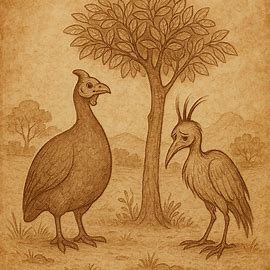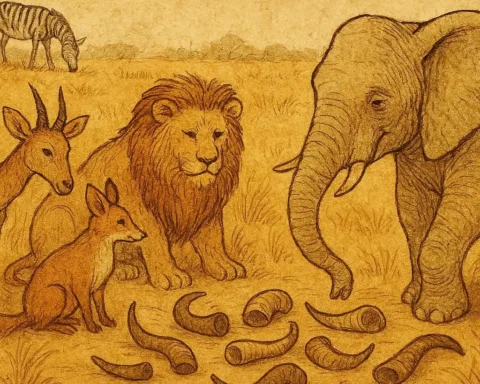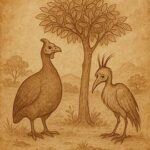Gather round, people of the veld, gather round,
Listen to the tale of Kung the Eland,
Listen to the story of how swiftness came,
To the sacred one who bears the ancient name…
Long, long ago, when the world was still learning its ways and the animals were settling into their forms, there lived Kung the Eland, the largest and most majestic of all the antelope. In those early days! Kung moved slowly across the Kalahari, his great body heavy and graceful, but not swift like the springbok or fleet like the gemsbok.
Big and beautiful, strong and grand,
Kung walked slowly across the land,
With horns like spears and coat like gold,
A sight most wondrous to behold…
The Eland was beloved by the San people, who saw in him the spirit of abundance and respect. They hunted him only with great ceremony, never taking more than they needed, always thanking his spirit for the gift of life. But Kung’s size and slow movement made him an easy target not just for the respectful hunters, but for those who hunted without honor.
San hunters came with grateful hearts,
Following the ancient hunting arts,
They thanked the Eland for his gift,
And left his children time to drift…
One dry season, when the water holes were few and the grazing sparse, a group of selfish hunters came from the far country. These men hunted not for need but for greed, taking more than they could use, wasting the sacred meat, showing no respect for the animals they killed.
Greedy hunters from afar,
Following the brightest star,
They came with spears and hearts of stone,
To claim what was not their own…
Their leader was a man named Gao, whose heart had grown as hard as the ironwood tree. He saw Kung grazing in a valley and said to his men, “Look at that great beast! His meat would feed us for many days, and his hide would make fine karosses. We shall take him easily, for he is too slow to escape.”
But the animals of the veld had been watching these greedy hunters. Jackal, the clever trickster, had seen their wasteful ways. Crow had observed their disrespect. Even the tiny ground squirrel had noticed how they left the bones unburied and the spirits unthankful.
Jackal sly and crow so wise,
Saw the greed behind their eyes,
Ground Squirrel small but brave and true,
Knew exactly what to do…
Jackal approached Kung as he grazed peacefully. “My large friend,” said the trickster, “danger comes your way. The greedy hunters plan to take you, and they will show no respect for your spirit or your children.”
Kung raised his noble head, his dark eyes reflecting ancient wisdom. “I am not afraid to give my life to those who hunt with honor,” he said. “It is the way of things. But these men you speak of they hunt with no gratitude, no ceremony, no understanding.”
“I hear your words, friend Jackal sly,
But tell me, must I run and hide?
My people need me for their food,
How can I tell the bad from good?”
Crow cawed from his perch on a camel thorn tree. “The good hunters carry gratitude in their hearts,” he said. “They hunt only what they need. They honor your spirit with ceremony and song. These others they are like the hyena, taking everything and giving nothing back.”
Ground Squirrel chittered from his burrow entrance. “We have a plan, great Kung. But you must trust us and do exactly as we say.”
Trust the small and trust the clever,
Trust the bond that breaks never,
For in the veld, we stand as one,
Under the same burning sun…
The next morning, as the greedy hunters approached the valley, Jackal began his trickery. He led them in circles, his tracks confusing their trail. Crow flew overhead, cawing false directions. Ground Squirrel and his family dug holes in their path, making them stumble and fall.
But still the hunters pressed on, driven by their greed. They cornered Kung in a rocky canyon, their spears raised, their hearts showing no reverence for the sacred hunt.
Hunters close with spears held high,
No prayer, no thanks, no sacred cry,
Just greed that burns like desert sand,
Taking all with grasping hand…
It was then that the spirits of the ancestors intervened. The ancient San who had hunted with respect for countless generations appeared as shimmering heatwaves in the canyon. They had watched the disrespectful hunters and were displeased.
“Kung,” spoke the voice of the ancestor spirits, “you have always been willing to give your life to feed the people. But these are not your people. These hunters take without giving, kill without gratitude, waste without thought. You deserve the gift of swiftness to escape such disrespect.”
Spirits rise from sacred ground,
Ancient wisdom, ancient sound,
They see the wrong and see the right,
And grant the Eland wings of flight…
The spirits breathed upon Kung, and suddenly his heavy body felt light as the morning breeze. His muscles became like coiled springs, his hooves like drums that barely touched the earth. Power flowed through his great frame, the power of the wind itself.
The hunters threw their spears, but Kung leaped high over their heads, his great body sailing through the air like a bird. He landed running, his hooves drumming a rhythm of freedom across the canyon floor.
See him leap and see him bound,
Hooves like thunder on the ground,
Swift as wind across the plain,
Never to be caught again…
The greedy hunters watched in amazement as !Kung disappeared over the horizon, moving faster than they had ever seen any creature move. They returned to their own country empty-handed and ashamed, telling stories of the magical eland that flew like the wind.
But when the respectful San hunters came, following their ancient ways, Kung would sometimes allow himself to be taken, knowing that they hunted with gratitude, ceremony, and need. His spirit would be honored, his meat shared equally, his bones buried with thanksgiving.
Good hunters come with grateful hearts,
Following the sacred arts,
Kung may choose to give his life,
To feed the children and the wife…
From that day forward, all eland possessed the gift of swiftness. They could bound across the veld like the wind itself, their great bodies moving with surprising grace and speed. But they used this gift wisely running from those who hunted without respect, while sometimes allowing themselves to be taken by those who hunted with honor.
The other animals learned from !Kung’s example. They too began to flee from wasteful hunters while accepting the respectful hunt of the San, who understood that every life taken was a sacred gift, every hunt a ceremony of gratitude.
Now all elands run like wind,
Their swiftness is their gift rescind,
From spirits who protect the good,
And punish those who misunderstood…
And so it was that Kung the Eland gained his swiftness, not through his own desire, but through the intervention of spirits who understood that respect and gratitude must flow both ways—from hunter to hunted, from taker to giver, from human to animal.
This is why eland runs so fast,
A gift from spirits of the past,
To flee from greed and find the true,
Hunters who give honor due…
The Sacred Teaching
The story of why the eland runs swiftly teaches us that survival is not just about physical strength or speed, but about the sacred relationship between all living beings. In the natural world, the circle of life depends on mutual respect predator and prey, hunter and hunted, all must honor the balance that sustains life itself. The eland’s gift of swiftness came not as a reward for his own actions, but as protection from those who would take without giving, who would hunt without gratitude, who would waste the precious gift of life. This teaches us that when we approach any relationship with respect and gratitude whether with animals, plants, or other humans we create harmony. But when we approach with greed, disrespect, or waste, we break the sacred bonds that hold the world together. The eland’s speed reminds us that all creatures have the right to protect themselves from exploitation, and that true strength comes not from dominating others, but from understanding our place in the great web of life. When we hunt, gather, or take from the earth, we must do so with ceremony, gratitude, and restraint, remembering that every gift of life deserves our deepest respect and that the spirits of our ancestors watch to ensure that the ancient ways of honor and balance are maintained.
Knowledge Check: San Eland Stories and Hunting Traditions
Q1: What makes the eland significant in San culture and folktales like “Why the Eland Runs Swiftly”? A1: The eland holds sacred status in San culture as the largest antelope and most prized hunting target. San folktales featuring eland emphasize respectful hunting practices, spiritual connections between hunter and prey, and the belief that animals possess spiritual power that responds to human behavior and intentions.
Q2: How do San hunting folktales teach ethical hunting practices and animal respect? A2: San hunting stories like “Why the Eland Runs Swiftly” distinguish between respectful hunting (taking only what’s needed, performing ceremonies, showing gratitude) and greedy hunting (taking excessively, showing no respect, wasting meat). These folktales teach that animals will cooperate with ethical hunters but flee from disrespectful ones.
Q3: What role do trickster animals play in traditional San folktales about hunting and survival? A3: Trickster animals like Jackal in San folktales serve as protectors of natural balance, using cleverness to help other animals escape unethical hunters while allowing respectful hunting to continue. They represent the intelligence and cooperation needed for survival in harsh desert environments.
Q4: How do San folktales explain animal behaviors and physical characteristics through spiritual intervention? A4: San animal stories attribute physical traits like the eland’s speed to spiritual intervention by ancestors or nature spirits. These explanations serve both as natural history education and moral teaching, showing how spiritual forces reward respect and punish greed in the natural world.
Q5: What hunting ceremonies and traditions are reflected in San eland folktales? A5: San eland stories reference traditional hunting practices including pre-hunt ceremonies, spiritual preparation, gratitude rituals, proper meat sharing, and respectful treatment of animal remains. These folktales preserve ancient hunting protocols essential for maintaining harmony between humans and animals.
Q6: How do San survival stories teach about the balance between taking from nature and showing respect? A6: San folktales like “Why the Eland Runs Swiftly” teach that survival depends on reciprocal respect—humans can take from nature for genuine needs, but must give back through ceremony, gratitude, and restraint. This balance ensures continued cooperation between humans and the natural world essential for desert survival.






